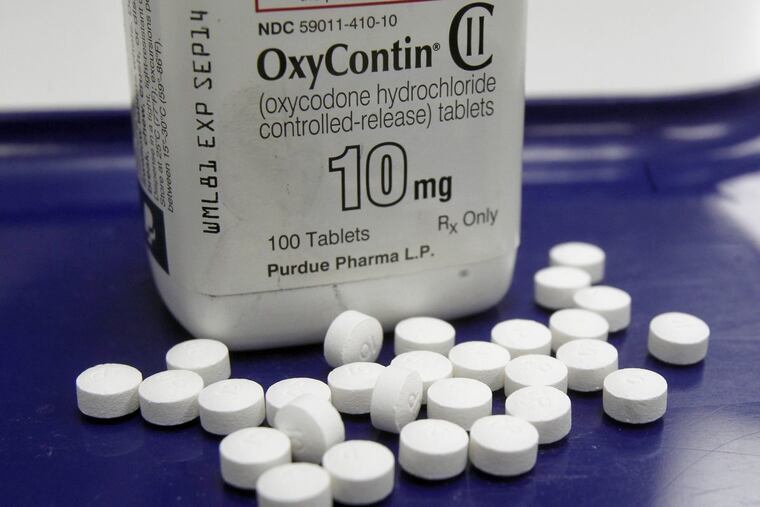Big Pharma must be held accountable for its role in opioid crisis
For 20 years, the pharmaceutical industry has been whitewashing the lasting impact of highly addictive narcotics through its use of marketing, effectively encouraging doctors and others to prescribe these powerful drugs in increasing, extremely dangerous levels.

Every day across the commonwealth, 13 people die as a result of a drug overdose involving illicit or prescribed opioids. Those 13 people taken from us leave children without parents, students without teachers, and families with missing seats at the dinner table.
Philadelphia is among the hardest-hit spots in Pennsylvania, with more than 900 unintentional deaths in 2016 — triple the number of homicides. Nearly one-third of these deaths occurred in chronically poor and homeless populations. This crisis has changed the landscape of every community and neighborhood in Philadelphia.
None of us has the luxury of claiming that this is not our problem. This is a Philadelphia crisis, a Pennsylvania crisis, a crisis that hits all of us. And just as other leaders are called upon to use the power at their disposal to fight the epidemic, I have a responsibility to use mine, as state treasurer, to do the same.
It wasn't long ago that American doctors prescribed opioids like OxyContin and Vicodin exclusively for pain management associated with surgery or cancer treatment. In 1980, the first study was published that led many doctors to believe narcotics were safe to prescribe for chronic pain management — a finding that was later disproved by the Centers for Disease Control and Prevention. Less than a decade later, there was a surge in opioid production and distribution from companies like Johnson & Johnson, Purdue Pharma, and McKesson Corp. — pharmaceutical giants collectively known as Big Pharma.
For the last 20 years, the pharmaceutical industry has been whitewashing the lasting impact of highly addictive narcotics through its use of marketing, effectively encouraging doctors and other providers to prescribe these powerful drugs in increasing, extremely dangerous levels.
In other words, Big Pharma found a way to turn a profit at the expense of American lives. By misleading doctors to overprescribe a drug powerful enough to treat the level of pain endured by patients recovering from major surgery for more routine issues, Big Pharma made possible the addiction of thousands in Philadelphia alone. But it doesn't stop at prescription pills manufactured and distributed by these companies.
When that prescription runs out — and it will — users who are dependent are often drawn to a substance far less expensive and, unfortunately, extremely accessible on the black market: heroin. In every corner of Pennsylvania, heroin is classified as the number-one drug threat to its residents, but Philadelphia has the highest purity for the lowest cost compared with other major cities. Now, with synthetic opioids like fentanyl and carfentanil on the rise, lethal doses of heroin are landing in the hands of our friends and neighbors.
This has infused our neighborhoods with the plague of addiction and significant misuse of drugs, leading to children being removed from their homes, overcrowded prisons, and a stagnant economy, as otherwise able-bodied Americans find themselves unable or unwilling to find work.
As Pennsylvania's treasurer, my responsibilities include overseeing our state investments — your taxpayer dollars. These investments include Big Pharma companies, as the providers of the medicine and devices that our friends and neighbors need on a regular basis to survive.
Recently, I joined state treasurers from West Virginia and Illinois to demand that Big Pharma takes the necessary steps to combat the epidemic at its source. McKesson, located in San Francisco, is one of the nation's largest prescription-drug wholesalers. While flooding communities with opioids, McKesson's revenues have more than doubled from $93 billion to $199 billion over the past 10 years, with a $60 billion jump in 2015 alone.
These companies need to step forward and take active steps to address the growing challenges facing millions of prescription drug users across the nation.
We are encouraged that McKesson announced it will split the roles of CEO and chairman of the board of directors, and has rejected an executive compensation package, a long-overdue action given that Big Pharma companies have paid their top executives more than $450 million over the past four years. But my colleagues and I intend to keep working to make sure that these companies put public safety before private profits, and to hold Big Pharma accountable for its role in the crisis.
None of us is immune to the disease of addiction. This is the time to join together to empower those who are recovering to build a better future for themselves, for their families, and for Pennsylvania.
Joe Torsella is treasurer of Pennsylvania. @JoeTorsella.